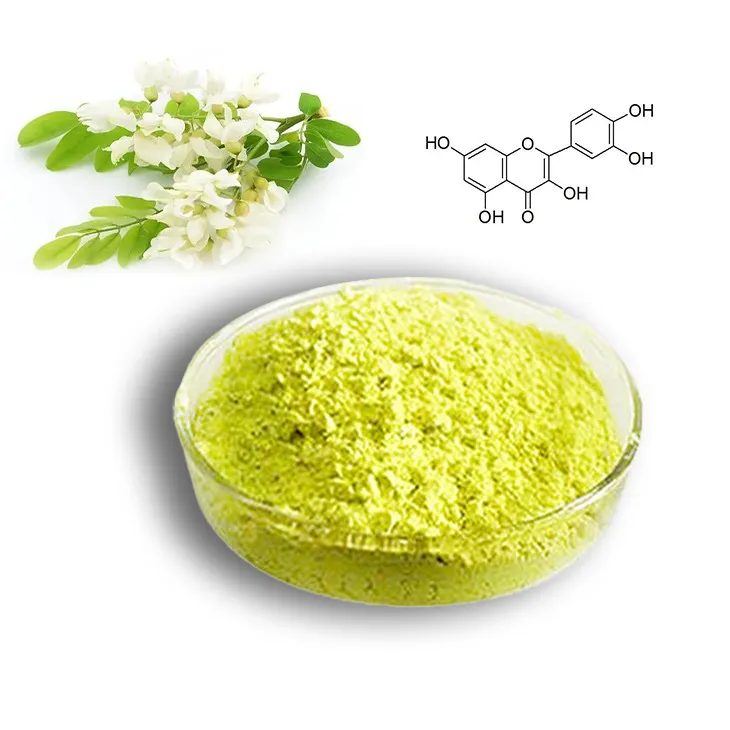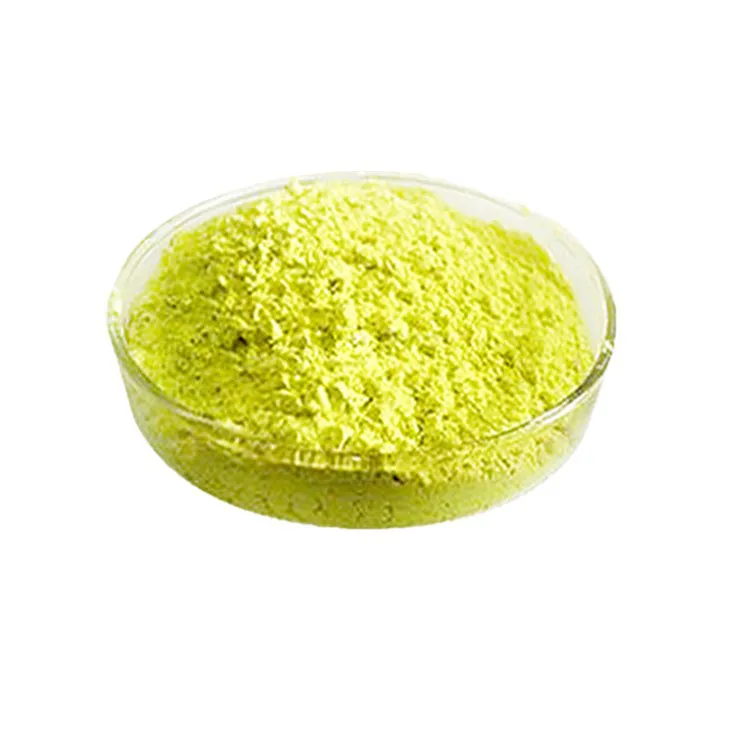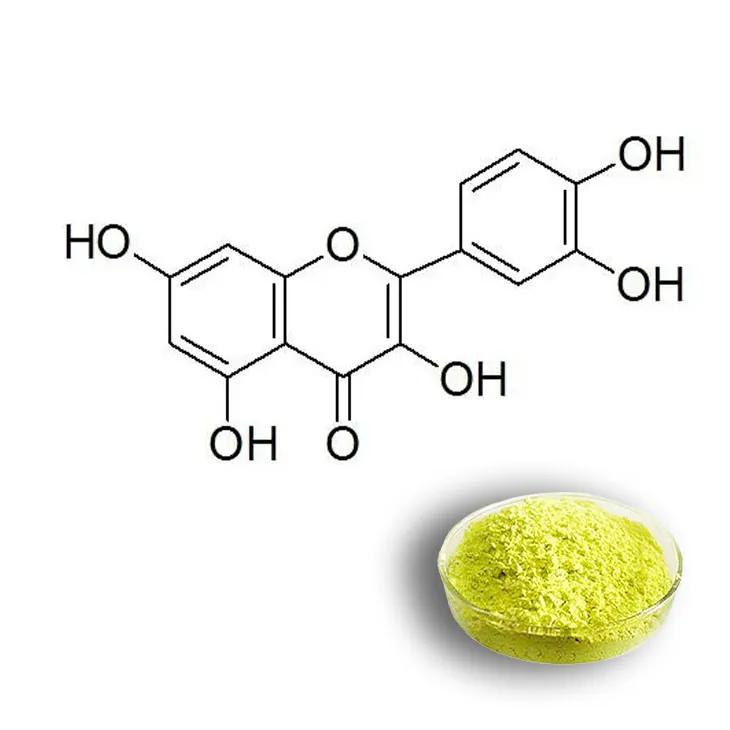- 0086-571-85302990
- sales@greenskybio.com
Entering the quercetin industry? This is why you need a reliable supplier.
2024-12-21

1. Introduction to the Quercetin Industry
The Quercetin industry has been steadily growing in recent years and is emerging as a highly promising field. Quercetin, a flavonoid found in many fruits, vegetables, and grains, has been associated with a wide range of potential health benefits. These include antioxidant, anti - inflammatory, and anti - cancer properties, among others. As a result, the demand for quercetin - based products, such as dietary supplements, functional foods, and pharmaceuticals, has been on the rise.

2. The Importance of a Reliable Supplier
2.1 Product Quality
Product quality is of utmost importance when entering the quercetin industry. A reliable supplier will ensure that the quercetin they provide meets the highest standards. This is crucial for several reasons. Firstly, in the case of dietary supplements and pharmaceuticals, regulatory bodies around the world have strict quality requirements. For example, in the United States, the Food and Drug Administration (FDA) has specific guidelines for the purity, potency, and safety of ingredients used in these products. If the quercetin supplied does not meet these standards, it can lead to non - compliance issues, which may result in product recalls, legal penalties, and damage to the company's reputation.
Secondly, customers today are more informed and demanding. They expect the products they consume to be of high quality. In the case of quercetin - based products, consumers are often seeking the potential health benefits associated with the compound. If the quality of the quercetin is sub - par, it may not deliver the expected results, leading to disappointed customers and a negative impact on brand loyalty.
2.2 Stable Supply
Another key aspect of a reliable supplier is the ability to provide a stable supply of quercetin. Production disruptions can be extremely costly for companies in the quercetin industry. For example, if a manufacturer of quercetin - based dietary supplements suddenly runs out of the ingredient due to an unreliable supplier, it may have to halt production. This can lead to missed delivery deadlines, loss of customers to competitors, and increased costs associated with rescheduling production and finding alternative suppliers on short notice.
Moreover, in some cases, the availability of quercetin may be affected by factors such as crop yields (since it is sourced from plants), geopolitical issues in the regions where it is produced, or disruptions in the supply chain due to natural disasters or other unforeseen events. A reliable supplier will have contingency plans in place to mitigate these risks and ensure a continuous supply of quercetin.
2.3 Cost - Effectiveness
Cost - effectiveness is also a significant factor when choosing a quercetin supplier. A good supplier can help a company achieve this through optimized procurement processes. They may be able to offer competitive prices due to their efficient production methods, economies of scale, or strategic sourcing. For example, a supplier with a large - scale production facility may be able to produce quercetin at a lower cost per unit compared to smaller suppliers. This cost advantage can be passed on to the buyer, allowing them to improve their profit margins.
Furthermore, a reliable supplier can also help reduce costs associated with quality control. Since they are committed to providing high - quality quercetin, the need for extensive in - house quality testing by the buyer may be reduced. This can save both time and resources, contributing to overall cost - effectiveness.

3. How to Identify a Reliable Quercetin Supplier
3.1 Quality Assurance Certifications
One of the first things to look for when identifying a reliable quercetin supplier is their quality assurance certifications. These certifications are evidence that the supplier adheres to strict quality standards. For example, ISO certifications (such as ISO 9001 for quality management and ISO 22000 for food safety management) are widely recognized and indicate that the supplier has implemented comprehensive quality management systems.
Good Manufacturing Practice (GMP) certifications are also crucial, especially for suppliers in the pharmaceutical and dietary supplement industries. GMP ensures that the manufacturing processes are carried out in a controlled and hygienic environment, minimizing the risk of contamination and ensuring product consistency.
3.2 Reputation in the Industry
The supplier's reputation in the industry is another important factor. A supplier with a long - standing positive reputation is more likely to be reliable. This can be assessed through various means. One way is to look at customer reviews and testimonials. Companies that have had positive experiences with the supplier are likely to recommend them. Additionally, industry awards and recognitions can also be an indication of a supplier's good standing.
It is also beneficial to network with other industry players and ask for their opinions on potential suppliers. They may be able to provide insights based on their own experiences, such as whether a supplier has a history of timely deliveries, consistent product quality, and good customer service.
3.3 Research and Development Capabilities
A reliable quercetin supplier should also have strong research and development (R & D) capabilities. This is important because the quercetin industry is constantly evolving, and new research may lead to improved extraction methods, higher - quality products, or new applications for quercetin.
Suppliers with R & D capabilities are more likely to stay ahead of the curve in terms of product innovation. For example, they may be able to develop new forms of quercetin that are more bioavailable or have enhanced stability. This can give companies that use their quercetin an edge in the market, as they can offer more advanced and effective products.

4. Building a Long - Term Relationship with a Reliable Supplier
4.1 Communication and Collaboration
Once a reliable quercetin supplier has been identified, building a long - term relationship is essential. Communication and collaboration play a key role in this. Open and regular communication channels should be established between the buyer and the supplier. This allows for the sharing of important information, such as changes in demand forecasts, new product requirements, or potential issues in the supply chain.
Collaboration can also extend to areas such as product development. For example, the supplier and the buyer may work together to develop new quercetin - based products or improve existing ones. This type of partnership can lead to mutual benefits, such as increased market share and enhanced product competitiveness.
4.2 Contractual Agreements
Clear and comprehensive contractual agreements are another important aspect of building a long - term relationship with a quercetin supplier. These agreements should cover various aspects, including product specifications, pricing, delivery schedules, and quality control requirements.
The contract should also include provisions for handling potential disputes or unforeseen circumstances. For example, in the event of a sudden increase in the cost of raw materials, how will the price adjustment be determined? Having these details clearly defined in the contract can help prevent misunderstandings and protect the interests of both parties.
4.3 Continuous Evaluation
Even with a reliable supplier, it is important to conduct continuous evaluation. The quercetin industry is subject to change, and a supplier's performance may also vary over time. Regular evaluations can help identify any areas for improvement or potential issues before they become major problems.
Evaluation criteria may include product quality consistency, delivery performance, and the supplier's ability to adapt to changing market requirements. Based on the evaluation results, appropriate actions can be taken, such as providing feedback to the supplier for improvement or, in extreme cases, considering alternative suppliers if the current one is no longer meeting the company's needs.

5. Conclusion
Entering the quercetin industry offers great potential, but it also comes with challenges. One of the most important aspects to consider is choosing a reliable supplier. A reliable supplier not only ensures product quality, stable supply, and cost - effectiveness but also becomes a valuable partner in the long - term success of a company in this industry. By carefully identifying and building relationships with reliable suppliers, companies can position themselves to take advantage of the growing opportunities in the quercetin industry.
FAQ:
What are the key factors to consider when choosing a quercetin supplier?
When choosing a quercetin supplier, key factors include product quality to meet regulatory and customer demands, stable supply to avoid production halts, and cost - effectiveness achieved through optimized procurement. Additionally, their reputation in the market, compliance with industry regulations, and ability to provide technical support can also be important considerations.
How can a reliable quercetin supplier ensure product quality?
A reliable quercetin supplier can ensure product quality by implementing strict quality control measures. This may include sourcing high - quality raw materials, following good manufacturing practices (GMP), conducting regular quality tests at various stages of production, and having proper storage and handling procedures to prevent contamination or degradation of the product.
Why is stable supply important in the quercetin industry?
Stable supply is crucial in the quercetin industry because any disruption can lead to production delays. For businesses relying on quercetin for their products, such as in the pharmaceutical or nutraceutical sectors, a break in the supply chain can result in unfulfilled orders, loss of customers, and potential damage to the company's reputation. It also allows for better planning and forecasting in terms of production schedules and inventory management.
How can a supplier contribute to cost - effectiveness in the quercetin business?
A supplier can contribute to cost - effectiveness in the quercetin business through optimized procurement processes. They may be able to negotiate better prices for raw materials due to their scale of operations or long - standing relationships with suppliers. Additionally, efficient production and delivery methods can reduce costs associated with transportation, storage, and waste. They can also offer competitive pricing while maintaining quality, which helps the buyer to keep their production costs in check.
What are the potential risks of choosing an unreliable quercetin supplier?
The potential risks of choosing an unreliable quercetin supplier include receiving sub - standard products that do not meet regulatory requirements or customer expectations. This can lead to product recalls, legal issues, and damage to the brand's reputation. Unstable supply can cause production stoppages, leading to financial losses. There may also be issues with hidden costs, such as unexpected price hikes or additional fees for services that were not initially disclosed.
Related literature
- Quercetin: Properties, Applications, and Market Trends"
- "The Role of Suppliers in the Success of the Quercetin - Based Product Manufacturing"
- "Quality Assurance in the Quercetin Supply Chain"
- ▶ Hesperidin
- ▶ citrus bioflavonoids
- ▶ plant extract
- ▶ lycopene
- ▶ Diosmin
- ▶ Grape seed extract
- ▶ Sea buckthorn Juice Powder
- ▶ Beetroot powder
- ▶ Hops Extract
- ▶ Artichoke Extract
- ▶ Reishi mushroom extract
- ▶ Astaxanthin
- ▶ Green Tea Extract
- ▶ Curcumin Extract
- ▶ Horse Chestnut Extract
- ▶ Other Problems
- ▶ Boswellia Serrata Extract
- ▶ Resveratrol Extract
- ▶ Marigold Extract
- ▶ Grape Leaf Extract
- ▶ blog3
- ▶ blog4
- ▶ blog5
-
Wheat Germ Extract
2024-12-21
-
Licorice Root Extract Powder
2024-12-21
-
Natural grape seed extract
2024-12-21
-
Lemon Balm Extract
2024-12-21
-
Plantain extract
2024-12-21
-
Eyebright Extract
2024-12-21
-
Konjac Powder
2024-12-21
-
Chasteberry Extract
2024-12-21
-
Curcumin
2024-12-21
-
Hawthorn Extract
2024-12-21





















